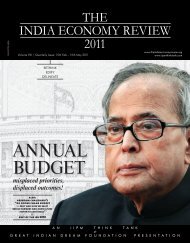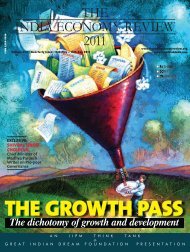Download - The India Economy Review
Download - The India Economy Review
Download - The India Economy Review
Create successful ePaper yourself
Turn your PDF publications into a flip-book with our unique Google optimized e-Paper software.
P LANNING P ARADIGM<br />
Almost all wonderful plans devised by<br />
our Planning Commission never saw<br />
themselves bearing fruits in reality<br />
market economy getting stronger, our<br />
Planning Commission failed to reinvent<br />
itself in order to sync with this economic<br />
metamorphosis. In fact, almost all wonderful<br />
plans devised by our Planning<br />
Commission never saw themselves bearing<br />
fruits in reality. <strong>The</strong> plan always oscillated<br />
between time and cost overruns.<br />
<strong>The</strong> political pressure forced the Planning<br />
Commission to come up with<br />
projects without any justifi able feasibility<br />
report on fi nancial or economic viability<br />
of the same.<br />
Across the world, with change in economic<br />
model, the centralized planning<br />
system saw its gradual demise. Starting<br />
with the Soviet Union, the Central Committee<br />
of the Communist Party of the<br />
Soviet Union that was designed as the<br />
highest body of the Communist Party of<br />
the Soviet Union (CPSU) started off well<br />
but with time was reduced to just a rubber<br />
stamp body and saw its closure in 1991<br />
with demise of the Communist Party itself.<br />
Present day, the Economic, Social<br />
and Environmental Council of France is<br />
actually a consultative assembly with limited<br />
roles. Unlike ours, it does not play a<br />
role in the adoption of statutes and regulations<br />
but is only there as an advisory<br />
body assisting the lawmaking bodies on<br />
social and economic areas and policies, if<br />
any. Most of the time the body is largely<br />
dormant or inactive and responds only<br />
when the executive arm asks for proposal<br />
on social or economical issues. Talking<br />
cue from France’s Economic and Social<br />
Council, the United Kingdom (UK) designed<br />
its own planning body called the<br />
10 THE IIPM THINK TANK<br />
National Economic Development Offi ce<br />
or NEDO, which later on was restructured<br />
to assist its new corporatist economic<br />
planning forum called National Economic<br />
Development Council (NEDC).<br />
<strong>The</strong> main work of NEDC (with assistance<br />
from NEDO) was to act as a forum for<br />
collective bargaining between management,<br />
trades unions and government in an<br />
attempt to address Britain's relative economic<br />
decline. However, this was abolished<br />
in 1992 and UK now is a member of<br />
the European Union's Economic and<br />
Social Committee (EESC or EcoSoc).<br />
EESC is more of a consultative assembly<br />
comprising employers, employees, trade<br />
unions and representatives of various sectors.<br />
In simple word it’s like CII or FICCI<br />
from <strong>India</strong>. <strong>The</strong> role of the EESC is<br />
largely consultative though it sometime<br />
gets involved in the matters of social policy,<br />
social and economic cohesion, environment,<br />
education, health, customer<br />
protection, industry, transport, indirect<br />
taxation and few more. It is nowadays<br />
focusing on boosting the role of civil society<br />
organisations in non-member countries.<br />
As recent as 2008 China also have<br />
remodelled its centralized planning body<br />
(State Planning Commission and State<br />
Development Planning Commission) to<br />
create the National Development and<br />
Reform Commission (NDRC). <strong>The</strong><br />
NDRC mainly works to formulate policies<br />
for economic and social development and<br />
advice on streamlining economic system<br />
of the country. <strong>The</strong> NDRC is actually a<br />
remodelled body of the State Planning<br />
Commission (SPC).<br />
During early 1980s and 1990s, many<br />
governments who used to follow a planned<br />
economy model began deregulating in a<br />
big way and started adopting more market-oriented<br />
planning model. In case of<br />
USSR, the change of economic system<br />
itself became the reason for its closure.<br />
Attributes and agendas, which were previously<br />
scrutinized by central planning body,<br />
were now left to the private sector wisdom.<br />
Today centralized planning system<br />
exists in very few countries like Cuba,<br />
Libya, Saudi Arabia, Iran, North Korea,<br />
Burma and <strong>India</strong>, to a limited extent.<br />
Countries like France, China and Russia,<br />
to a large extent follow a planning process<br />
wherein the main objective is to maintain<br />
a coordination (and develop synergy) between<br />
state and private entity. <strong>The</strong>se<br />
countries follow Indicative planning<br />
model (aimed to bridge information gap in<br />
economies and increase economic performance).<br />
<strong>The</strong> main work of the body is to<br />
advice the state to design subsidies, grants,<br />
and taxes but then it limits itself to advis-





